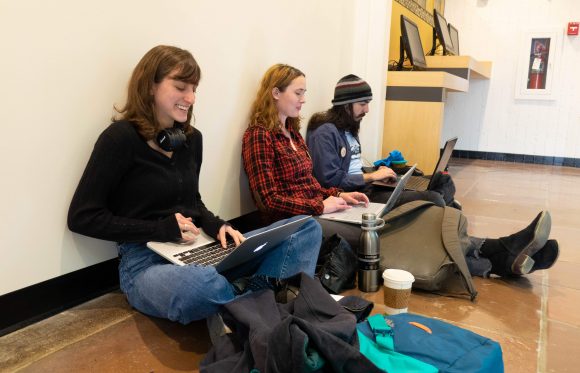
Graduate students Janet Ruppert and Lucy van Kleunen participate in the sit in to protest graduate student fees in the Regent Administrative Center. Oct. 21, 2019 (Kevin Wu / CU Independent)
University of Colorado Boulder Graduate School Dean Scott Adler announced an effort to increase recruitment and support of underrepresented groups at the University of Colorado’s graduate school earlier this month.
“If we’re going to change the way academe looks, if we’re gonna change the way society looks really, we need to be getting greater access to our graduate programs for more diverse students,” Adler said.
Adler said they have made some progress on diversifying the graduate student population but recently the numbers have plateaued. This has been a focus of his since taking on the role of Dean. Adler became Dean of CU’s graduate school in June 2019 after serving as chair of the Political Science department.
The plan to increase diversity includes a new Graduate School Diversity Recruitment Fund and more than $500,000 for diversity fellowships and grants.
“Let’s use some of the resources that we have here at the university and in the graduate school in particular and provide it to the programs themselves but help them come up with a plan,” Adler said.
Some students, though, wonder where these funds are coming from.
“There has been a lot reworking of budgets in many, if not all departments, research centers and institutes around campus to compensate for the reduced funding from COVID-19, so how is CU able to expand funding to these initiatives, ” Juan Ramirez said in an email. Ramirez is a UCW steering committee and anti-racism committee member.
To secure funding, the initiative requires graduate programs to redesign their recruitment plans including a diversity statement from each individual program. These statements should mirror the values put forward by the larger graduate school. The programs will submit their plans at the beginning of November and will develop them further with Adler’s help.
“It’s really empowering the departments to do what they have wanted or thought about doing or are thinking about doing and then well learn from that,” Adler explained.
The initiative is one of a number of steps CU is taking to increase diversity and support underrepresented groups including the recent search for a Chief Diversity Officer.
“I see a lot of announcements on all these “great” initiatives aimed at improving diversity, equity, and inclusion, but it doesn’t show systemic transformation that aims to de-center white supremacist, top-down administrative logics being employed by regents, and CU executives,” Ramirez said in an email.
Overall, students are wary of the lack of transparency and communication with students as CU works to become an antiracist institution.
“The wording is vague, the process of creating and implementing this plan has not been transparent, there has been no communication or even acknowledgement of BIPOC students articulating and organizing around diversifying, and there is no clear pathway for communication, transparency, or accountability moving forward from the Grad School’s statements so far,” Janet Ruppert said in an email in reference to the initiative. She references DiversifyCUNow’s critique of the university’s IDEA plan as applicable to this initiative too.
Ruppert, a PhD student and member of the UCW steering committee points to this and lack of attention to existing efforts made by BIPOC CU community members as major issues with this initiative.
“Presenting new initiatives such as this recruitment plan, without responding to or honoring groups who actually hold underrepresented identities and are already organizing around this, is disrespectful to our community,” Ruppert said in an email.
Kylen Solvic, a current Ph.D. student in the geography department echoed these concerns.
“CU should listen to the recommendations of campus groups like Diversify CU Now, Radical BIPOC Womxn & Femmes Collective, and the Black Student Alliance, including divesting from the Boulder Police in order to fund mental health resources, anti-racism training, and more,” Solvic said in an email.
Some, like Solvic, worry that this initiative might not take into account the importance of building a supportive and welcoming environment once students arrive. He said it’s good to see the graduate school investing in recruitment of BIPOC students, but is skeptical about the effectiveness of the program if it is not coupled with actions to make the campus a more welcoming and anti-racist environment.
Solvic also emphasized the importance of focusing on creating a welcoming environment in tandem with a focus on recruitment.
“Retention is as big a problem as recruitment, if not bigger,” Solvic said in an email.
Contact Breaking News Editor Mairead Brogan at mairead.brogan@colorado.edu.
